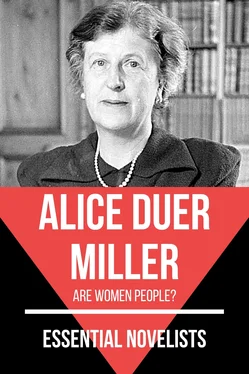The Author
Are Women People?
By Alice Duer Miller
You're twenty-one to-day, Willie,
And a danger lurks at the door,
I've known about it always,
But I never spoke before;
When you were only a baby
It seemed so very remote,
But you're twenty-one to-day, Willie,
And old enough to vote.
You must not go to the polls, Willie,
Never go to the polls,
They're dark and dreadful places
Where many lose their souls;
They smirch, degrade and coarsen,
Terrible things they do
To quiet, elderly women—
What would they do to you!
If you've a boyish fancy
For any measure or man,
Tell me, and I'll tell Father,
He'll vote for it, if he can.
He casts my vote, and Louisa's,
And Sarah, and dear Aunt Clo;
Wouldn't you let him vote for you?
Father, who loves you so?
I've guarded you always, Willie,
Body and soul from harm;
I'll guard your faith and honor,
Your innocence and charm
From the polls and their evil spirits,
Politics, rum and pelf;
Do you think I'd send my only son
Where I would not go myself?
Alice Duer Miller (July 28, 1874 – August 22, 1942) was a writer from the U.S. whose poetry actively influenced political opinion. Her feminist verses made an impact on the suffrage issue, and her verse novel The White Cliffs encouraged U.S. entry into World War II. She also wrote novels and screenplays.
Alice Duer was born in New York City on July 28, 1874, into a wealthy family. She was the daughter of James Gore King Duer and Elizabeth Wilson Meads, the daughter of Orlando Meads of Albany, New York. Her great-grandfather was William Alexander Duer, President of Columbia College. Her great-great-grandfather was William Duer, an American lawyer, developer, and speculator from New York City. He had served in the Continental Congress and the convention that framed the New York Constitution. In 1778, he signed the United States Articles of Confederation. Her great-great-great-grandfather was William Alexander, who claimed the disputed title of Earl of Stirling and was an American Major-General during the American Revolutionary War.
She was also a descendant of Senator Rufus King, who was an American lawyer, politician, and diplomat. He was a delegate for Massachusetts to the Continental Congress. He also attended the Constitutional Convention and was one of the signers of the United States Constitution on September 17, 1787.
By the time of her entrance into society, her family had lost most of its fortune. She entered Barnard College in 1895, studying Mathematics and Astronomy. She helped to pay for her studies by selling novels and short essays. She and her sister Caroline jointly published a book of poems.On October 5, 1899, she married Henry Wise Miller at Grace Church Chapel in New York City. He was born in 1877, the son of Lt. Commander Jacob Miller in Nice, France, where his father had been serving with the U.S. Navy.
They moved to Costa Rica, where he attempted to develop rubber cultivation, which eventually failed. In 1903, she, Miller and their young son returned to New York.Her marriage lasted to the end of her life, but it was not tranquil.
She became known as a campaigner for women's suffrage and published a brilliant series of satirical poems in the New York Tribune. These were published subsequently as Are Women People?. These words became a catchphrase of the suffrage movement. It reads:
"FATHER, what is a Legislature?/ A representative body elected by the people of the state./ Are women people?/ No, my son, criminals, lunatics and women are not people./ Do legislators legislate for nothing?/ Oh, no; they are paid a salary./ By whom?/ By the people./ Are women people?/ Of course, my son, just as much as men are."
As a novelist, she scored her first success with Come Out of the Kitchen in 1916. The story was made into a play and later the 1948 film Spring in Park Lane. She followed it with a series of other short novels, many of which were staged and (increasingly) made into films.
Her novel in verse Forsaking All Others (1933) about a tragic love affair, and many consider her greatest work. In the 1920s and 1930s, many of her stories were used for motion pictures, such as Are Parents People? (1925), Roberta (1935), and Irene (1940), taking her to Hollywood. She also became involved in a number of motion picture screenplays, including Wife vs. Secretary (1936). Her name appears in the very first issue of The New Yorker as an advisory editor.
Alice Duer Miller died in 1942 and was interred at Evergreen Cemetery in Morristown, New Jersey.
Конец ознакомительного фрагмента.
Текст предоставлен ООО «ЛитРес».
Прочитайте эту книгу целиком, купив полную легальную версию на ЛитРес.
Безопасно оплатить книгу можно банковской картой Visa, MasterCard, Maestro, со счета мобильного телефона, с платежного терминала, в салоне МТС или Связной, через PayPal, WebMoney, Яндекс.Деньги, QIWI Кошелек, бонусными картами или другим удобным Вам способом.












